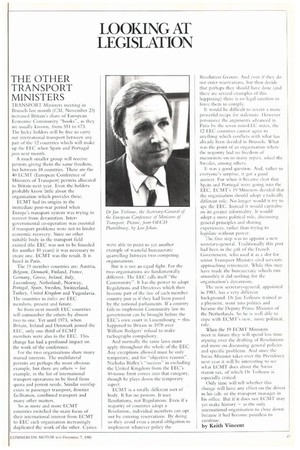LOOKING AT LEGISLATION
Page 49

If you've noticed an error in this article please click here to report it so we can fix it.
THE OTHER TRANSPORT MINISTERS
TRANSPORT Ministers meeting in Brussels last month (CM, November 23) increased Britain's share of European Economic Community "books", as they are usually known, from 551 to 673. The lucky holders will he free to carry our international transport between any pair of the 12 countries which will make up the EEC when Spain and Portugal join next month.
A much smaller group will receive permits giving them the same freedom, but between 18 countries. These are the 40 ECMT (European Conference of Ministers of Transport) permits allocated to Britain next year. Even the holders probably know little about the organisation which provides these.
ECMT had its origins in the immediate post-war period when Europe's transport system was trying to recover from devastation. Entergovernmental co-operation was essential if transport problems were not to hinder economic recovery. Since no other suitable body in the transport field existed (the EEC was not to be founded for another 10 years) it was necessary to create one. ECMT was the result. It is based in Paris.
The 19 member countries arc: Austria, BeighiM, Denmark, Finland, France, Germany, Greece, Ireland, Italy, Luxembourg, Netherlands, Norway, Portugal, Spain, Sweden, Switzerland, Turkey, United Kingdom and Yugoslavia. The countries in italics are EEC members, present and future.
So from next month EEC countries will outnumber the others by almost two to one. Yet until 1973, when Britain, Ireland and Denmark joined the EEC, only one third of ECMT members were also in the EEC. This change has had a profound impact on the work of the conference.
For the two organisations share many mutual interests. The multilateral permits are perhaps the roost obvious example, but there are others — for example, in the list of international transport operations to be freed from quota and permit needs. Similar overlap exists in passenger transport, frontier facilitation, combined transport and many other matters.
So as inure and more ECMT countries switched the main focus of their international interest from ECMT to EEC each organisation increasingly duplicated the work of the other. Cynics were able to point to yet another example of wasteful bureaucratic quarrelling between two competing organisations.
But it is not an equal tight. For the two organisations are fundamentally different. The EEC calls itself "the Community". It has the power to adopt Regulations and Directives which then become part of the law of each member country just as if they had been passed by the national parliaments. If a country fails to iinplement Community law its government can he brought before the EEC's own court in Luxembourg — this happened to Britain in 1978 over 11Villiarn Rodgers' refusal to make tachographs compulsory.
And normally the same laws must apply throughout the whole of the EEC. Any exceptions allowed must be only temporary, and for "objective reasons". Nicholas Ridley's "success" in excluding the United Kingdom from the EEC's 40-tonne limit conies into that category, though lie plays down the temporary aspect.
ECMT is a totally different sort of body. It has no powers. It uses Resolutions, not Regulations. Even if a majority of countries adopt a Resolution, individual members can opt out by entering reservations. By doing so they avoid even a moral obligation to implement whatever policy the Resolution favours. And even if they do not enter reservations, but then decide that perhaps they should have done (and there are several examples of this happening) there is no legal sanction to force them to comply.
It would be difficult to invent a more powerful recipe for stalemate. lhowever persuasive the arguments advanced in Paris by the seven non-LEC states, the 12 EEC countries cannot agree to anything which COldliCTS with what has already been decided in Brussels. What was tinpoint of an organisatiim where the majority had no freedom of TILITIOCL1 v rc on in tn,iny topics, asked the Swedes, among others.
It was a good question. And, rather to everyone's surprise, it got a good answer. For when it became clear that Spain and Portugal were going into the EEC. ECMT's 19 Ministers decided that the organisation should adopt a radically different role. No longer would it try to ape the EEC. Instead it would capitalise on its greater informality. It would adopt a more political role, discussing general principles and sharing experiences, rather than trying to legislate without power.
The first step was to appoint a new secretary-general. Traditionally this post had been in the gift of the French Government, who used it as a slot for senior 'transport Ministry civil servants approaching retirement. While this may have made the bureaucratic wheels run smoothly it did nothing for the organisation's dynamism.
The new secretary-general, appointed in 1983, has a very ditIerelit background. Or Jan Terlouw trained as a physicist, went into politics and became the Deputy Prime Minister of the Netherlands. So he is well able to cope with ECMT's new, more political, role.
When the 19 ECMT Ministers meet in future they will spend less time arguing over the drafting of Resolutions and more on discussing general policies and specific problems. And since the Swiss Minister takes over the Presidency next year it will be interesting to see what ECMT does about the Swiss transit tax, of which 1)r l'erlouw is especially critical.
Only time will tell whether thus change will have any effect on the driver in his cab, or the transport manager in Ins office. But if it does not ECMT may yet make history — as the only international organisation to close down because it had become pointless to continue.
by Keith Vincent




































































































